-
 Rising odds asteroid that briefly threatened Earth will hit Moon
Rising odds asteroid that briefly threatened Earth will hit Moon
-
Italy reels from Brignone broken leg with Winter Olympics looming

-
 Is the Switch 2 worth the price? Reviews are mixed
Is the Switch 2 worth the price? Reviews are mixed
-
Ancelotti’s tax trial wraps up in Spain with prosecutors seeking jail
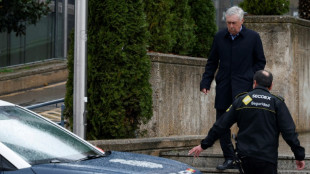
-
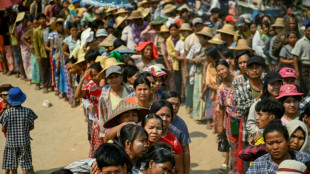 Civilians act to bring aid to Myanmar earthquake victims
Civilians act to bring aid to Myanmar earthquake victims
-
US trade gap narrows in February ahead of bulk of Trump tariffs
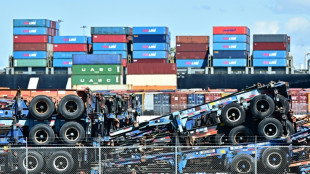
-
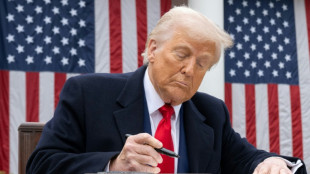 Stocks, dollar and oil sink as gold hits high on Trump tariffs
Stocks, dollar and oil sink as gold hits high on Trump tariffs
-
Countries eye trade talks as Trump tariff blitz roils markets
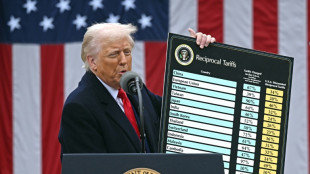
-
 Arsenal defender Gabriel out for rest of the season
Arsenal defender Gabriel out for rest of the season
-
Trump says US to emerge 'stronger' as markets tumble over tariffs
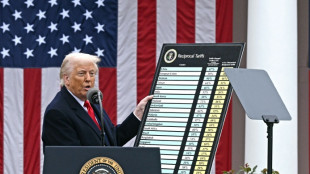
-
 Wiegman says Belgium games can aid England's women's Euros title defence
Wiegman says Belgium games can aid England's women's Euros title defence
-
Prosecutors demand jail term for Ancelotti for tax fraud
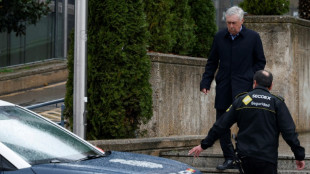
-
 Syria accuses Israel of deadly destabilisation campaign
Syria accuses Israel of deadly destabilisation campaign
-
Skiing World Cup champion Brignone suffers broken leg

-
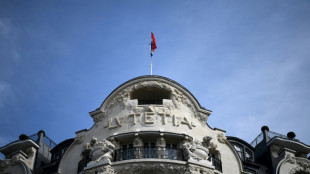 Iconic Paris hotel Lutetia taken over by Mandarin Oriental
Iconic Paris hotel Lutetia taken over by Mandarin Oriental
-
Nepal capital chokes as wildfires rage
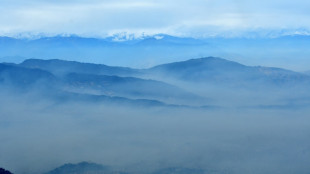
-
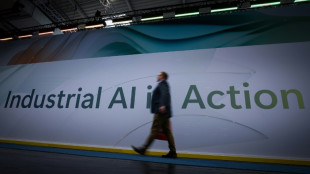 AI could impact 40 percent of jobs worldwide: UN
AI could impact 40 percent of jobs worldwide: UN
-
'Shocking': US tariffs worse than feared for Vietnamese exporters
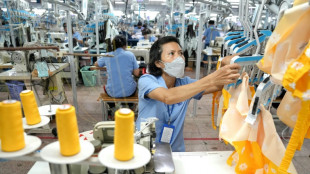
-
 Liverpool's Slot happy to let Premier League title bid take its course
Liverpool's Slot happy to let Premier League title bid take its course
-
USA sole bidder for 2031 Women's World Cup, UK set to host in 2035

-
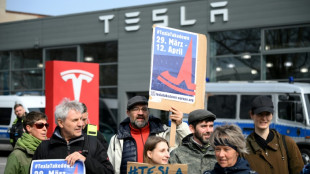 Tesla sales fall again in Germany amid Musk backlash
Tesla sales fall again in Germany amid Musk backlash
-
Italy's skiing champion Brignone air-lifted to hospital after crash

-
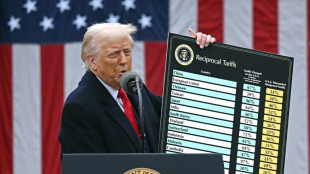 US trade partners eye talks after Trump tariff blitz
US trade partners eye talks after Trump tariff blitz
-
Evenepoel adds Tour de Romandie to comeback programme
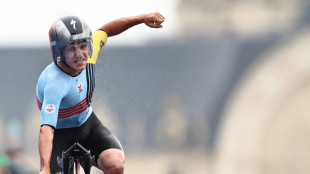
-
 Defending champion I Am Maximus heads final field for Grand National
Defending champion I Am Maximus heads final field for Grand National
-
Rubio says US committed to NATO - but tells allies to spend more
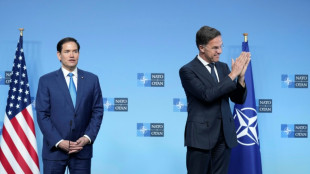
-
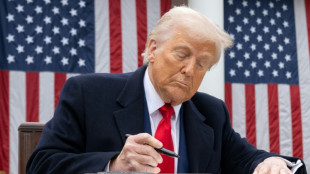 Dollar, stocks sink as gold hits high on Trump tariffs
Dollar, stocks sink as gold hits high on Trump tariffs
-
India eyes opportunity despite Trump tariffs hit
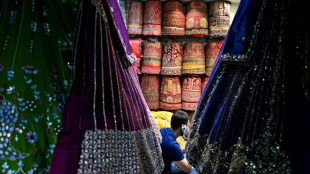
-
 UK show reveals tawdry tale of Shakespeare folio theft
UK show reveals tawdry tale of Shakespeare folio theft
-
Top Russian official in Washington for talks on improving ties
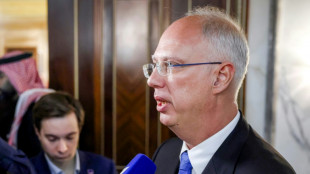
-
 Sinner's former physio to blame for failed dope tests, says ex-physical trainer
Sinner's former physio to blame for failed dope tests, says ex-physical trainer
-
Germany slams Trump tariffs, US tech titans in crosshairs
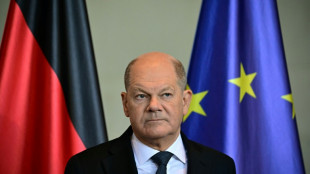
-
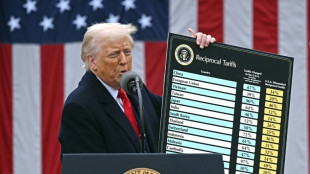 Trump tariff blitz sparks retaliation threats, economic fears
Trump tariff blitz sparks retaliation threats, economic fears
-
Search for Malaysia's long missing MH370 suspended
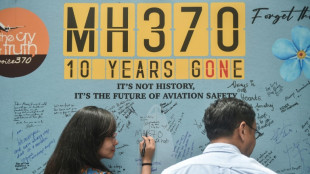
-
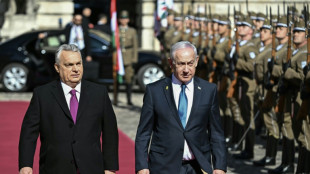 Hungary announces ICC withdrawal as Israel's Netanyahu visits
Hungary announces ICC withdrawal as Israel's Netanyahu visits
-
Trump's tariffs sting Asian giants, including US allies
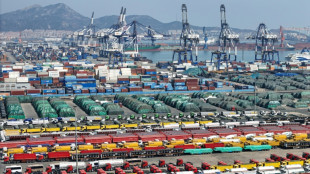
-
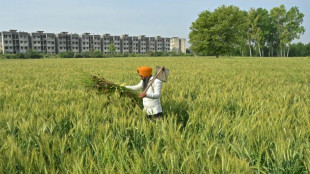 India says 'examining the implications' of US tariffs
India says 'examining the implications' of US tariffs
-
Evenepoel set to make injury return at Tour de Romandie
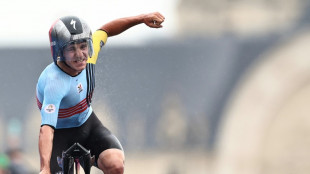
-
 USA sole bidder for 2031 Women's World Cup, UK set to host in 2035 - Infantino
USA sole bidder for 2031 Women's World Cup, UK set to host in 2035 - Infantino
-
McLaren's Norris says it's 'our turn' for success

-
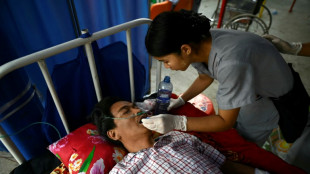 Lessons and liquids: buried alive in Myanmar's earthquake
Lessons and liquids: buried alive in Myanmar's earthquake
-
Trump tariffs spark fears for Asian jobs, exporting sectors
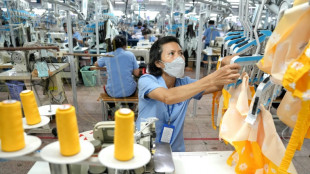
-
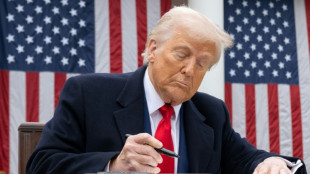 Stocks and dollar sink, havens rally as Trump tariffs fan trade war
Stocks and dollar sink, havens rally as Trump tariffs fan trade war
-
Runners fly to North Korea for first post-Covid Pyongyang Marathon
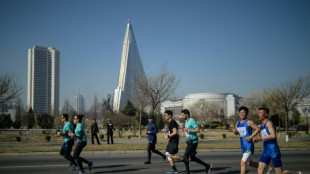
-
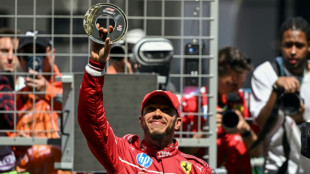 Hamilton rubbishes claims he's lost faith in Ferrari
Hamilton rubbishes claims he's lost faith in Ferrari
-
Nintendo Switch 2 sparks excitement despite high price

-
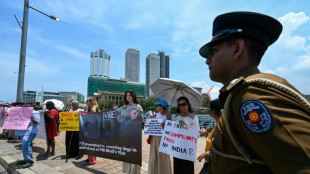 Sri Lanka's crackdown on dogs for India PM's visit sparks protest
Sri Lanka's crackdown on dogs for India PM's visit sparks protest
-
S Korea police raise security levels ahead of impeachment verdict
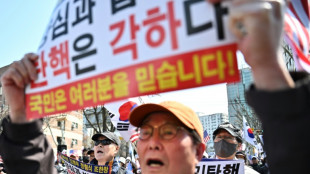
-
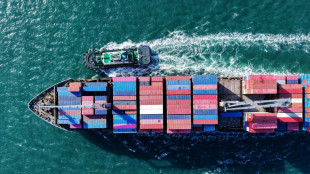 China vows 'countermeasures' to sweeping new US tariffs
China vows 'countermeasures' to sweeping new US tariffs
-
Trump jolts allies, foes and markets with tariff blitz
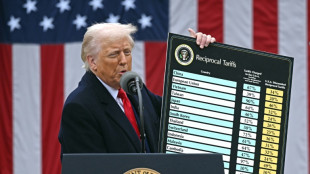
| RBGPF | -0.41% | 67.72 | $ | |
| CMSD | -1.11% | 22.58 | $ | |
| NGG | 5.72% | 69.774 | $ | |
| CMSC | -0.99% | 22.28 | $ | |
| SCS | -7.4% | 10.67 | $ | |
| RYCEF | -0.31% | 9.75 | $ | |
| VOD | 2.88% | 9.39 | $ | |
| BTI | 3.51% | 41.715 | $ | |
| GSK | 2.59% | 38.64 | $ | |
| RELX | 1.07% | 51.53 | $ | |
| RIO | -1.18% | 59.2 | $ | |
| BCE | 2.42% | 22.36 | $ | |
| JRI | -1.6% | 12.835 | $ | |
| BCC | -8.39% | 94.17 | $ | |
| AZN | 3.73% | 75.02 | $ | |
| BP | -7.25% | 31.525 | $ |
Germany doesn't want any more migrants?
Germany, once a beacon of openness during the 2015 migrant crisis when it welcomed over a million refugees, appears to be undergoing a profound shift in its stance on immigration. Under the leadership of Friedrich Merz, the newly elected chancellor from the Christian Democratic Union (CDU), the country is tightening its borders and rethinking its reliance on foreign labour. This pivot, driven by economic pressures, security concerns, and a resurgent far-right, raises questions about the future of a nation long defined by its post-war commitment to multiculturalism and economic pragmatism.
A Legacy of Openness Under Strain:
Germany’s immigration policy has historically been shaped by necessity and morality. After World War II, the "Wirtschaftswunder—the economic miracle—relied" on "Gastarbeiter" (guest workers) from Turkey and southern Europe to rebuild the nation. In 2015, Chancellor Angela Merkel’s decision to open borders to Syrian and other refugees was both a humanitarian gesture and a bid to bolster an ageing workforce. By 2020, immigrants and their descendants comprised 26% of Germany’s 83 million residents, per the Federal Statistical Office, contributing significantly to sectors like manufacturing and healthcare.
Yet, the mood has soured. The CDU’s victory in the 23 February 2025 federal election, securing 28.5% of the vote, came amid a surge for the anti-immigrant Alternative für Deutschland (AfD), which captured 20%. Merz, forming a coalition with the Social Democratic Party (SPD), has vowed to address what he calls “uncontrolled inflows,” signalling a departure from Merkel’s legacy.
Economic Pragmatism Meets Saturation:
Germany’s economy, Europe’s largest, has long depended on immigrants to fill labour gaps. In 2024, the Institute for Employment Research (IAB) estimated a shortage of 400,000 skilled workers, particularly in engineering and nursing. The birth rate, at 1.5 children per woman, remains well below replacement level, amplifying the need for foreign talent. So why the reversal?
Uneducated immigrants are a burden on the German welfare system:
Analysts point to a saturation point. Unemployment, though low at 5.5% in 2024, masks regional disparities and a growing perception that immigrants strain welfare systems. The influx of 200,000 Ukrainian refugees since 2022, while largely welcomed, has stretched housing and social services, with cities like Berlin reporting a 20% rise in rents over two years. Merz has argued that Germany must “prioritise integration over importation,” citing a 2024 Interior Ministry report that 30% of recent arrivals remain jobless after five years—a statistic seized upon by critics of open borders.
Security and the Far-Right Shadow - Too many Migaten are simply criminal:
Security concerns have further fuelled the shift. High-profile incidents, such as the December 2024 knife attack in Mannheim by an Afghan asylum seeker, which left three dead, have reignited debates about vetting and deportation. The AfD, capitalising on such events, has pushed a narrative of “immigrant crime,” despite data showing that foreign nationals’ offence rates (excluding immigration violations) align with those of native Germans. Merz, while distancing himself from the AfD’s rhetoric, has pledged tougher asylum rules and faster removals of rejected applicants, a nod to public unease.
The far-right’s electoral gains—126 projected Bundestag seats—have pressured mainstream parties to act. Posts on X reflect a polarised populace: some decry “a betrayal of German values,” while others cheer “a return to sovereignty.” Merz’s coalition, balancing the SPD’s pro-immigration leanings, must navigate this divide.
Policy Shifts and Global Implications:
Concrete measures are emerging. In February 2025, Merz announced plans to cap asylum applications at 100,000 annually—down from 300,000 in 2023—and expand “safe third country” agreements, allowing deportations to nations like Turkey. The Skilled Immigration Act, liberalised in 2023 to attract professionals, faces scrutiny, with proposals to raise income thresholds and tighten language requirements. Meanwhile, the EU’s New Pact on Migration, which Germany endorsed in 2024, is under review as Berlin seeks stricter external border controls.
Globally, this retrenchment could dim Germany’s image as a progressive leader. Its ageing population—projected to shrink to 79 million by 2050 without immigration—poses a long-term economic risk. The Confederation of German Employers (BDA) warned in January 2025 that curtailing inflows could cost 1% of GDP growth annually by 2030. Yet, political expediency seems to trump such forecasts for now.
A Nation at a Crossroads:
Germany’s turn from immigration reflects a confluence of pressures: economic limits, security fears, and a populist tide. It does not signal an absolute rejection—labour shortages ensure some openness persists—but a recalibration towards control and selectivity. For Merz, the challenge is twofold: assuaging a restive electorate while preserving the economic engine that immigrants have long fuelled. Whether this balancing act succeeds will shape not just Germany’s future, but Europe’s.

The Roman Empire and its downfall?

Argentina, Milei and the US dollar?

Is this Europe's plan for China?

Donald J. Trump: America is back

Meta's announcements and digital services?

Hungary: China's CATL battery factory

Alice Weidel: AfD Chancellor Candidate 2025

Russia: Is Putin's time nearly up?

China, Trump, and the power of war?

Iran's Ayatollahs the next to Fall?

Who wins and who loses in Syria?



